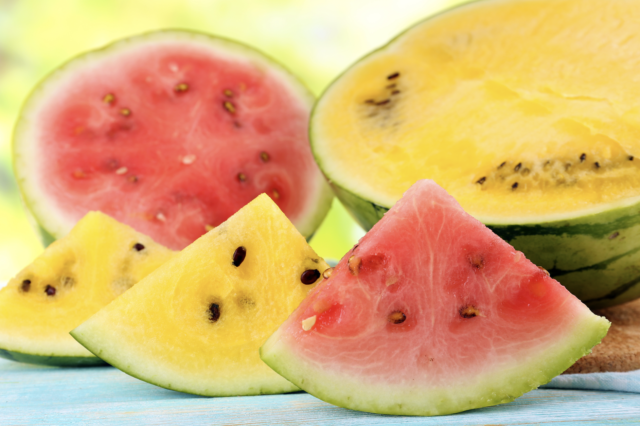by Kelly Reeves
“The true Southern watermelon is a boon apart, and not to be mentioned with commoner things. It is chief of this world’s luxuries, king by grace of God over all the fruits of the earth. When one has tasted it, he knows what the angels eat. It was not a Southern watermelon that Eve took: we know it because she repented.”
-Mark Twain
It was completely out of my control. I was born on August 3rd, National Watermelon Day. From my first breath of life, I have had an out-of-control desire for watermelons. Watermelons have been the source of much happiness, and a little bit of stress throughout my existence.
A neighbor who lived about a half mile away, Willie Coy Ford, was a watermelon farmer and a friend of the family. He raised the sweetest Black Diamond and Jubilee melons I’d ever tasted. On years when melons were scarce, they were scarce for everyone except Willie Coy. He knew how to make it happen. He taught me a few of his tricks of the trade but swore me to secrecy. A secret is a secret, so I won’t be sharing those in this article.
As a child I had the Ten Commandments drummed into my head everyday of the week and twice on Sundays. As you can imagine, I was caught completely off guard when my dad handed me a backpack late one July evening and said, “Sneak up to Willie Coy’s field and get us a watermelon.” I asked if I should knock on Willie Coy’s door first, to which dad said, “ No. Just ease in there real quiet, put a melon in the backpack, and ease back home.” I didn’t feel very good about committing my first crime, especially when my first victim was a longtime family friend. But, I did exactly as I was instructed and stole a huge Black Diamond melon and headed home. What I didn’t account for is the weight of the melon. I quickly learned that a life of crime wasn’t easy. That melon weighed at least forty pounds and barely fit in the backpack. I had to take several breaks before I made it home with the melon. When I finally arrived home with the goods, we sat on the front porch and ate the sweet juicy melon and spit seeds until we couldn’t eat another bite. Although the stolen melon may have been the best melon I’ve eaten to date, the overwhelming guilt took toll on my enjoyment.
Over the years, I thought a lot about the melon crime and the memories always brought about feelings of guilt. In my early twenties, I began a career in law enforcement when I applied with the local police department. I began testing and going through the hiring process. When I was scheduled for the polygraph exam, my first thought was of my criminal act in the melon patch. I was terrified of my criminal past being discovered and therefore being disqualified as a police recruit. I knew I had to confess and make amends with Willie Coy, now an old man.
I drove right past the crime scene, now grown up and no longer farmed, and turned into Willie Coy’s driveway. It’s true, we criminals always return to the scene of the crime. I knocked on the door and waited. Willie Coy came to the door and out on the porch where we sat and visited. He could tell something was wrong by the ashamed look on my face. I confessed my sin from ten years earlier and told Willie Coy I wanted to pay for the melon I had stolen. He began to laugh and said, “Kel, Mr. Mickey called me and told me he was going to send you up here to “steal” a melon after dark and not to shoot you. He came by and paid me the next day.” I suffered years of guilt and conviction for a crime I didn’t really commit. Now I’m the victim! I took and passed my polygraph exam and began a thirty year career. Willie Coy and dad are both gone now but I think of them both every time I cut open a watermelon.
It’s not summer without it. The name says it all. Watermelon is one of the most naturally hydrating and refreshing foods available. Not only is it delicious, but it contains up to 93 percent thirst quenching water to refresh you on those hot summer days. A summertime get-together without chilled watermelons would be a complete flop.
Fruit or Vegetable?
Watermelon is technically a vegetable. My Nanny said it is a cousin to a squash. If you look for it in the grocery store or at a roadside stand, it’s always with the fruit. The state of Oklahoma declared watermelon the official state vegetable in 2007. But, it is so sweet and juicy it must be a fruit. It really doesn’t matter. What it is, is delicious!
Health Benefits
• Watermelon contains a significant amount of vitamin A for healthy hair and skin, as well as vitamin C and potassium, which can help to lower blood pressure.
• Watermelon is low-fat and low calorie.
• Beta carotene and anti-oxidants found in watermelon are
said to help fight stress.
• Watermelon is high in amino acids and lycopene content
which scientists say may have protective effects against certain types of cancers and cardiovascular disease.
• Research is being done now on Citrulline, a substance being extracted from the rind of watermelons which is thought to offer protection against Alzheimers aand age related dementia.
• Citrulline, according to a study published in the journal
Urology, can help with mild to moderate erectile disfunction by improving blood flow.
How To Choose
The whole key to a great melon is sweetness. The melon farmers are very good at pulling them at the optimal time, but once you arrive at the retailer or roadside stand, you must pick the best of the pile. Ripe but not over-ripe.
• Lay one hand on the melon and tap or thump the rind with the other. If you feel a slight vibration, it is ready for eating.
• While thumping, listen for a deep, hollow “thud” sound. A sharp “tink” sound means it’s not ripe.
• Look for the ground spot. This is the part of the melon that was touching the ground as it grew in the field. It is a white spot, void of green. This spot turns to a yellow or cream color as it ripens. If the ground spot is still white, it is likely not ripe.
• Look at the stem. A crisp green stem tells you it was recently harvested, but it could be not completely ripe. A brown stem with a good “thump” is a good sign of ripeness. A completely dried, hard brown stem may be over-ripe.
• Poke the blossom end (opposite to the stem), with your thumb. If it is hard with no “give” at all, it’s probably green. If it is ripe, it will has some “give” to it. If the blossom end is soft, it is over-ripe.
Seeds or Seedless
• As a child we were warned not to ever swallow the seeds or a watermelon would grow in our tummy. Again, Nanny said so, so I still believe that may be true. At that time I had never heard of a seedless melon, though they seem to be preferred by the masses now. Not me. I want to eat an old fashioned melon with big black seeds that I can spit as far as possible, or save and plant next year.
Salt or No Salt
• This argument is like beans in chili. There’s no right or wrong answer. Sometimes I like to sprinkle salt on my melon, sometimes I eat it straight. More often than not, I use salt. The beauty is that you can eat it however YOU like. I posed this question to Texas watermelon farmer Mark Dickerson who replied, “I keep a Morton salt box on the dash of my pickup, if that tells you anything.”
Red Meat, Yellow Meat, or Orange Meat?
They all look the same on the outside and have crisp and juicy flesh on the inside. Red meat watermelons contain the chemical lycopene that causes the red color in fruits and vegetables and has been found to be beneficial to our health. Orange and yellow melon flesh is due to the lack of lycopene.
Yellow meat melons are said to have more Beta-carotine which is believed to protect against eye disease. Some watermelon lovers claim the orange meat melon is the sweetest, followed by yellow, and then red. I love them all but have lived by the adage “redder is better.”
Most southern farmers try to plant their melons the first part of April and hope to harvest before the fourth of July. It typically takes 80 to 90 days to grow a ripe melon. Mark Dickerson, a long time Van Zandt county watermelon farmer prefers a soft sandy loam soil to raise his melons. He said that although water is necessary for growth, he has always produced a better crop with sweeter melons on the dry years. Mark said, “ I could eat a watermelon every day of my life. They never get old.” I tend to agree!
A warning from an insider … If you marry into a family of watermelon farmers, as I did, you’ll never get the heart of another watermelon again. It’s hers … always. Daddy’s girl grew up with an unlimited supply of watermelons and was allowed to just eat the heart of them. To this day, she gets the heart and everyone else scavenges the rest of the melon.
I’ve thought long and hard in attempt to find something negative to say about watermelons so that this article doesn’t seem too one-sided, but was unsuccessful. It is so delicious and refreshing and it’s good for you. It tastes like a must be a dessert … but is not fattening. And when it’s gone, the cows and chickens love the rinds.
If you marry into a family of watermelon farmers, as I did, you’ll never get the heart of another watermelon again.












